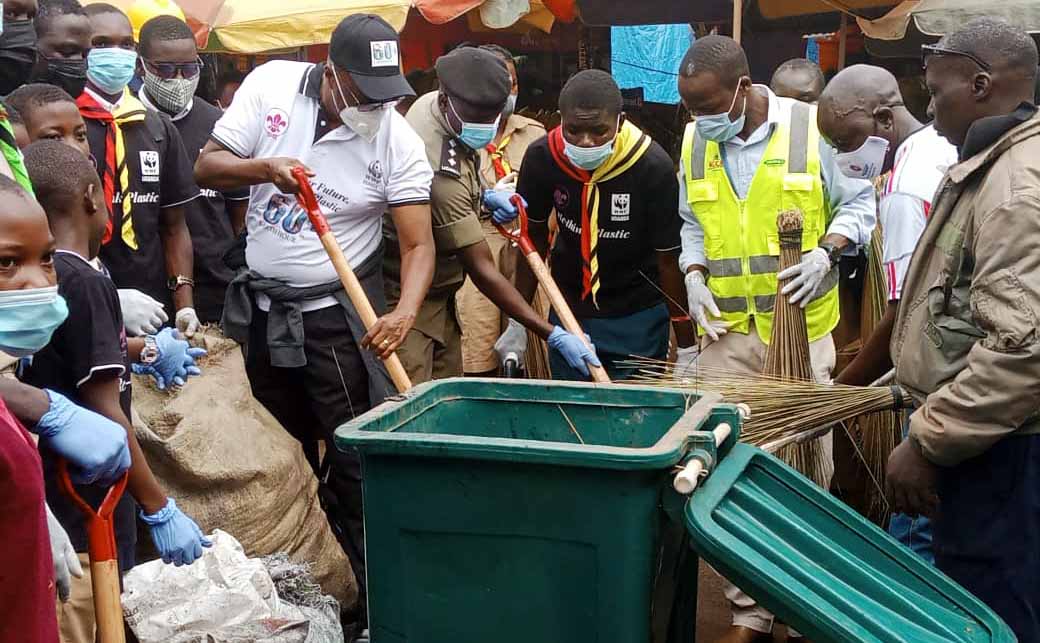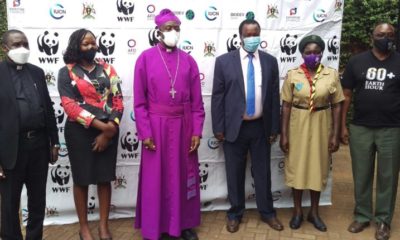News
Rethink plastics; targeting mindset change in war against plastics

WWF boss David Duli with colleagues cleaning Bugoloobi market
World Wide Fund for nature in Uganda (WWF) has launched its earth hour campaign 2022 aimed at boosting the fight against plastics disposal.
The campaign is themed ‘Re-think Plastics’.
The essence of the campaign, WWF officials say is to inspire the public and raise awareness on the threat posed by plastics disposal and to help to bring about mindset change that will lead to positive action at local, regional and global levels.
Addressing the press at Kiswa Primary School in bugolobi on February 22, 2022, Executive Director WWF David Duli said that this year’s Earth Hour offers the opportunity for the global community to make their voices heard in this pivotal year and demand a nature-positive future.
“2022 is the year world leaders take action at the UN CBD COP15 and commit to key political decisions on nature which will affect the health of our planet and our own future for decades to come,” he said
Duli added: “We are continuing to harm nature through irresponsible practices such as the indiscriminate use of plastics and the reckless disposal of plastic waste. This is one of the major causes of environmental degradation in the world today.”
It is estimated that at least 600 tons of plastics are consumed every day in Uganda and most of them are disposed off irresponsibly. More than half of these are used and disposed of in and around Kampala and at least 51% of plastic garbage in the city is left uncollected.
“Plastic waste is the major cause of clogging sewage systems in the city and partly explains the flooding in urban centers during rainy seasons. At the same time, the plastic waste ends up in wetlands, lakes and rivers.” he added
He further called upon Ugandans to ‘Shape Our Future’ by Re-Thinking Plastics.
“Through this campaign, we urge the public to take personal decisions to reduce and re-use plastics in our day-to-day life,” Duli said
Minister of Transport and Works Katumba Wamala, who represented the Deputy Speaker Anita Annet Among, said that over reliance on plastics is a major environmental challenge, especially considering the pollution that comes with badly managed plastics.
“The statistics about plastic pollution are alarming. Indeed, it is estimated that a total of 500 billion plastic bags are used every year around the world; and that 13 million tons of plastic leak into the water bodies, including the plastic bags that we use and throw every day,” he said
Katumba revealed that plastics litter beaches with serious consequences on the environment and health, noting, “They affect our lives and undermine our efforts to promote green growth in Uganda.”
He also thanked WWF and the scouts for leading by example and mobilizing Ugandans to take actions towards reducing waste generation as well as encouraging recycling and recovery.
“As a part of the campaign, I want to task all corporate companies and organisations to sign a ‘pledge card’ to reduce plastic watse and ensure a better and healthier workplace environment,” Katumba noted
A study conducted on Lake Victoria reveals that 20% of Nile Perch and Tilapia have microplastics in their gut. This is a result of the decomposing and ever-increasing plastic litter in water bodies.
In 1972, on average a person used up to two kilograms of plastic, but today a person uses up to 43kg of plastic annually. Since the 1950s, at least 8.3 billion tons of plastic have been produced worldwide.
According to the United Nations, ingestion of plastic kills an estimated one million marine birds and 100,000 marine animals each year. In the world’s beaches and shorelines 73% of waste is plastic materials. Plastics are artificially made of toxic chemicals and when they are badly disposed of groundwater and reservoirs are susceptible to leaking environmental toxins.
It is reported that in the major oceans of the world there are islands of plastics materials floating. They are deposited by the major rivers of the world. The Great Pacific garbage patch is often described as the Pacific Trash Vortex. Similar patches are also found in the Atlantic.
Comments

























